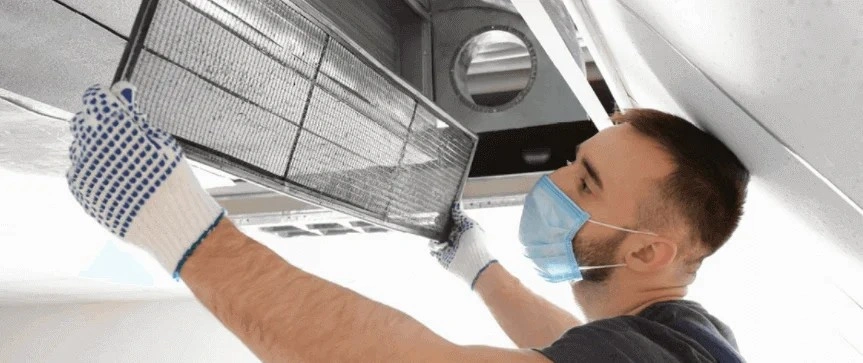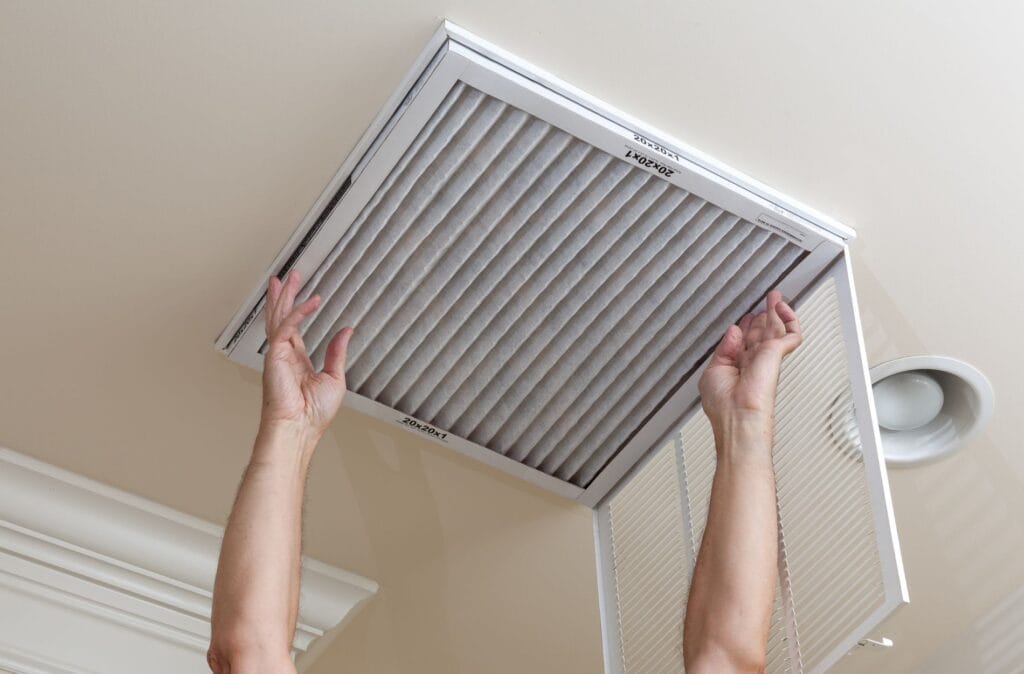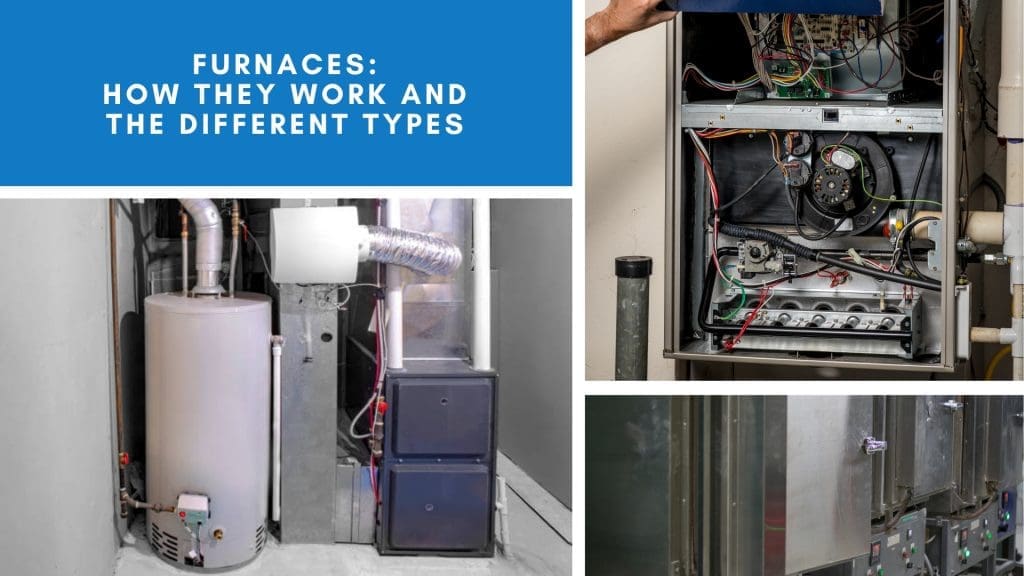There’s nothing quite like the comfort of a cool, air-conditioned room on a hot summer day. But what happens when that refreshing breeze is accompanied by a musty smell? AC smells Moldy — and this issue is more common than you might think.
If your air conditioner smells musty, you’re not alone. This is a common issue that many homeowners and business owners face.
Musty smells from your AC unit can be more than just a nuisance. They can indicate underlying issues that need to be addressed. Ignoring these smells can lead to poor air quality and potential health risks.

But don’t worry, you’ve come to the right place. As a seasoned HVAC professional, I’m here to help you understand why your air conditioner might smell musty and what you can do about it.
In this comprehensive guide, we’ll explore the common causes of musty smells in AC units. We’ll also discuss both DIY solutions and professional services that can help eliminate these odors.
Whether you’re a small business owner, a work-from-home professional, or a busy stay-at-home mom, this guide is designed to provide you with practical and actionable information.
So, let’s dive in and find out how to get your AC unit smelling fresh again.
Understanding Musty Smells in Your AC
When you notice a musty smell coming from your air conditioner, it’s typically a sign of mold or mildew growth. This issue can impact the quality of air in your home or office, making it an uncomfortable environment to be in.
Musty smells usually indicate that moisture has accumulated somewhere in your system. Understanding the source of this moisture is key to resolving the issue.
There are various factors that contribute to these odors. Let’s take a closer look at what could be causing them:
- Moisture buildup: Excess moisture often leads to mold.
- Dirty air filters: They can trap moisture and organic materials.
- Clogged drain lines: These can cause water to back up.
- Humidity: High indoor humidity contributes to musty odors.
- Poor ventilation: It prevents adequate drying of the system.
Each of these elements can create an ideal environment for mold and mildew to flourish. If addressed early, though, these issues are usually manageable.

By identifying the root cause, you can take the appropriate steps to eliminate musty odors and improve your indoor air quality. Taking proactive measures now can save you from a lot of headaches later.
The Science Behind Musty AC Odors
The musty smell in your AC primarily stems from microbial growth. Mold and mildew thrive in damp, dark environments where they can feed on organic materials like dust and pollen.
When your AC unit traps moisture, it becomes a breeding ground for these microbes. As the air circulates through the system, it can pick up these odors and disperse them throughout your space.
Additionally, air conditioning systems can sometimes lack proper ventilation. This means that any moisture collected within the system might not dry out as it should, further exacerbating the problem.
Common Culprits of Musty Smells
Now that we understand the science, let’s dive into the common causes of these unpleasant odors. One major culprit is dirty or clogged air filters. These filters trap dust and debris, which are perfect food sources for mold.
Clogged drain lines can also lead to musty smells. If the drain is blocked, water can accumulate instead of exiting the system, creating another ideal spot for mold growth.
Humidity is another factor that plays a big role. High levels of humidity in your home or office can lead to moisture collecting in your AC system, making musty smells more prevalent.
Finally, if your AC isn’t frequently maintained or if the airflow is restricted, moisture has more time to linger, which can worsen the problem.

To effectively address these issues, it’s important to know which parts of your AC are most likely to harbor mold and mildew:
- Air filters: These need regular changing.
- Drain lines: Ensure they aren’t blocked.
- Evaporator coils: These should be clean for efficient operation.
- Ductwork: Any musty smells here often need professional attention.
By regularly maintaining these components and keeping them dry, you can prevent musty smells from taking hold. Understanding these common culprits provides the foundation for tackling the odors head-on.
How to Identify Musty Smells in Your AC
Detecting musty smells in your AC early can save you from more significant issues down the line. One of the first signs is noticing a persistent odor whenever your AC is running. This odor may initially seem faint but can become more pronounced over time.
If you or someone in your home starts experiencing unexplained allergy symptoms, it might be time to investigate your AC. Musty smells can often be a sign of mold spores circulating in the air, which can cause sneezing, coughing, or throat irritation.
Keep an eye on the performance of your AC unit. If it seems to be working harder than usual to maintain the temperature, or if your energy bills are unexpectedly high, these could be indicators of mold buildup affecting efficiency.
Another sign is visible mold or mildew growth around the air vents or on the unit itself. This visual clue is a clear sign that your AC needs attention. Regularly inspecting these areas can help you catch any problems before they escalate.
Signs Your AC Unit Needs Attention
If your AC unit isn’t cooling effectively, it’s not just an inconvenience but a sign that something might be wrong. Reduced airflow can be a symptom of clogged filters or blocked vents, both of which can lead to musty smells.
Strange noises, like rattling or hissing, are another clue that your AC might need a checkup. These sounds often indicate issues with the unit’s internal components, which could be contributing to poor air quality.
Moreover, if you notice any moisture leakage or pooling around the unit, this is a red flag. Such leaks can indicate blocked drain lines, which can lead to musty odors if not addressed promptly. A proactive approach to these signs can prevent minor issues from turning into major repairs.
DIY Solutions to Freshen Up Your AC
Got a musty smell lingering from your AC? No worries, with a bit of elbow grease, you can tackle this smell head-on. Here are some DIY methods you can try at home before calling in the pros.
Start by checking and changing your air filters. Dirty filters are a common cause of musty odors, as they trap moisture and organic material. Ensure you replace them every 1-3 months, especially during the heavy-use seasons.
Don’t forget to clean your AC’s evaporator coils regularly. Built-up dirt and mold can lead to unpleasant smells. Turn off your unit and gently clean the coils with a soft brush or cloth.
For those dealing with high humidity levels in their home, consider using a portable dehumidifier. This device will help reduce overall moisture, making it less likely for mold to grow in your AC unit.
Another tip: inspect and clear out your AC’s drain line. A clogged line can cause stagnant water to sit, which encourages the growth of mildew. You might use a mixture of water and vinegar to flush out minor blockages.
Here’s a handy checklist for DIY AC maintenance:
- Change air filters regularly
- Clean evaporator coils
- Use a dehumidifier
- Inspect and clear drain lines
Cleaning and Maintenance Tips
Regular maintenance is the key to an odor-free air conditioner. To keep everything fresh, schedule routine cleanings and keep your unit in tip-top shape. Let’s delve into some essential cleaning tips to help you enjoy cleaner, fresher air at home.
Begin by powering down your AC unit for safety before performing any maintenance. With the unit off, open up the panels to access the interior components. Always consult your AC manual for proper instructions and safety guidelines.
Frequently cleaning the fins and fans of your unit helps prevent dirt buildup. Use a soft brush or a can of compressed air to gently remove debris from these areas.
Don’t overlook the importance of cleaning the condensate pan. This area collects excess water and can quickly become a breeding ground for mold if not regularly emptied and sanitized.
You can also consider installing a UV light system in your HVAC unit. These lights help kill mold and bacteria, providing a long-term solution to combating musty smells.
Here’s a quick maintenance tip list:
- Turn off the unit before cleaning
- Clean fins and fans
- Empty and sanitize condensate pan
- Consider UV light installation
When to Use Home Remedies
Home remedies can be a quick fix for minor AC smells, offering temporary relief. Common household items can be surprisingly effective in reducing odors. However, it’s essential to recognize when these methods are sufficient and when it’s time to call a professional.
You can use vinegar as a natural deodorizer. Simply soak a clean cloth in vinegar and wipe down accessible parts of the unit. It can neutralize musty odors for a short period.
Baking soda is another household staple that absorbs moisture and odor. Place an open box nearby your air vents as a temporary measure.
While these remedies can provide some relief, remember they’re not a substitute for regular maintenance. If the musty smell persists, it’s best to get in touch with an HVAC expert. A professional can provide a thorough clean and inspection, pinpointing the root of the issue and ensuring your system runs efficiently.
Professional Solutions for Persistent Musty Smells
While DIY solutions can help with minor odors, persistent musty smells often require professional intervention. HVAC professionals like us have the tools and expertise to tackle stubborn issues effectively. Let’s explore how professional solutions can make a difference in your indoor air quality.
First, a thorough inspection by an HVAC technician will identify the root cause of the musty odor. Whether it’s mold growth or a more complex issue, pinpointing the source is crucial for effective treatment.
Next, professional HVAC cleaning targets areas that DIY methods might miss. This service includes cleaning air ducts, removing mold, and sanitizing your entire system. It ensures a cleaner, healthier environment.
Beyond cleaning, technicians can install advanced systems such as UV lights that eliminate bacteria and mold. These units are strategically placed within your HVAC system to keep it fresher long-term.
Moreover, we assess factors like your home’s humidity levels and insulation. High humidity can worsen odors, so addressing these external factors is key for preventing them.
Professional services not only address existing odors but also help prevent future occurrences. They offer peace of mind, knowing your air is clean and your system runs smoothly.
The Role of HVAC Technicians in Odor Elimination
HVAC technicians are essential for eliminating persistent odors from your AC unit. We bring expertise and experience, ensuring every inch of your system is clean and efficient.
A technician’s first step is conducting a thorough assessment of your unit. This involves evaluating components like the evaporator coils, air ducts, and drainage system. Understanding these areas helps us identify issues causing the musty smell.
Once identified, we proceed with a targeted cleaning plan. This includes using industrial-grade cleaners that remove stubborn mold and mildew. These products are effective yet safe for your home environment.
In addition to cleaning, technicians suggest solutions tailored to your specific needs. This could involve recommending upgrades like better filters or dehumidifiers to maintain a fresh-smelling space.
Services Offered by LC Heating and Air Conditioning
At LC Heating and Air Conditioning, we offer a range of services designed to tackle and prevent musty AC smells. Our team is committed to providing top-notch service, ensuring your home feels comfortable and inviting.
We provide comprehensive HVAC inspections, identifying issues that contribute to those unpleasant smells. Our thorough approach means no problem is overlooked, ensuring complete resolution.
Our cleaning services are designed to rid your system of debris, mold, and odors. We use advanced equipment to ensure a thorough clean, leaving your air fresh and healthy.
In addition to cleaning, we install advanced solutions like UV lights and air purifiers. These systems work continuously to fight off mold and bacteria, providing long-term relief from odors.
Reach out today to learn more about our trusted services and how we can help refresh your home’s air quality!
Preventing Musty Smells: Best Practices for AC Care
Preventing musty odors in your AC system is all about consistent care. Regular checks and simple habits can keep your air fresh and your system efficient.
Start with a consistent maintenance routine. This involves cleaning and checking key parts regularly. It helps catch issues before they become big problems.
Here are some best practices for keeping musty smells at bay:
- Regularly change your air filters to prevent mold buildup.
- Clean or clear drain lines to avoid water backup.
- Schedule routine professional inspections.
- Ensure proper ventilation in your home.
- Use a dehumidifier to control indoor humidity levels.
Another important tip is to monitor your home’s humidity. High levels can promote mold growth, leading to musty odors. Using a dehumidifier can help maintain balanced humidity.
Finally, be mindful of how your AC system runs. An overworked system can overheat and fail to manage moisture properly. Contact a professional if you notice inefficiencies.
Regular Maintenance and Why It Matters
Regular maintenance of your AC system is key to preventing musty smells and keeping the system efficient. It may seem like a chore, but it saves time and money in the long run.
Regular maintenance helps identify potential issues early. These can include clogged drain lines or dirty filters. Addressing them promptly prevents further complications.
Moreover, scheduled maintenance extends the life of your AC unit. Clean systems operate better and use less energy. This means lower bills and fewer environmental impacts.
Neglecting maintenance can lead to serious issues like mold growth. Mold not only causes unpleasant odors but also impacts air quality and health. Frequent checks help avoid this.
So, consider setting reminders for routine tasks. Whether it’s monthly filter changes or annual professional inspections, these small efforts bring big benefits.
Upgrading Your AC System for Better Air Quality
Upgrading your AC system can significantly enhance indoor air quality. With modern advancements, you can enjoy a fresher, healthier home environment.
Consider investing in high-quality filters. They trap dust, mold spores, and other allergens, reducing odor. HEPA filters, for example, are effective for cleaner air.
You might also explore UV light technology. These systems kill bacteria and mold spores in the air. They’re a powerful tool in maintaining odor-free indoor spaces.
Another upgrade option is a whole-house dehumidifier. This system helps control humidity throughout your home, reducing mold growth risks.
By investing in these upgrades, you ensure a more comfortable living space. Alongside routine maintenance, your AC system will be more efficient, contributing to overall well-being.
The Health Risks of Ignoring Musty AC Smells
Musty odors in your AC aren’t just unpleasant. They can pose real health risks if ignored. Mold and mildew are often the culprits behind these smells. When they grow in your AC system, they can spread harmful spores into your home.
Breathing in these spores can lead to respiratory problems. This is especially concerning for those with asthma or allergies. Prolonged exposure might worsen symptoms or cause new health issues.
Children and the elderly are particularly vulnerable to poor air quality. A musty-smelling AC could compromise their well-being. It’s essential to address the issue promptly to protect your family’s health.
Ignoring these smells can also affect your mental well-being. Living or working in a space with unpleasant odors can be stressful. It might reduce productivity and increase discomfort.
Why Musty Smells Are More Than Just a Nuisance
Musty AC odors may seem like a minor inconvenience. However, they indicate a deeper problem that needs attention. These smells often point to mold and mildew growth.
Mold in your AC can impact indoor air quality. This affects everyone in the home, causing potential health issues. It’s more than just an unpleasant scent; it’s a risk.
Moreover, persistent odors can affect the value of your property. They can deter potential buyers or renters. It’s wise to resolve these issues for both present comfort and future benefits.
Prioritizing your health and home environment is crucial. Address musty AC smells promptly for a healthier, more pleasant living space.
Conclusion: What to Do When Your AC Smells Moldy
Tackling musty AC smells should be a priority for a comfortable home. With the right steps, you can enjoy fresh air again. Addressing these odors not only improves air quality but enhances overall comfort.
Don’t let musty smells linger and disrupt your peace. Act now to ensure a healthier environment for your family. Remember, fresh air is just a call away.
Contact LC Heating and Air Conditioning for Expert Help
When dealing with persistent musty odors, expert assistance makes a difference. LC Heating and Air Conditioning is here to help you reclaim fresh air. Our team is ready to diagnose and resolve any HVAC issues efficiently.
Call us for a professional assessment and effective solutions. We pride ourselves on delivering top-notch services tailored to your needs. Let us bring you the comfort and quality service you deserve.
Encouraging Proactive AC Maintenance
Stay ahead of potential issues by prioritizing regular AC maintenance. Proactive care prevents musty odors and prolongs your system’s lifespan. Regular check-ups and cleanings keep your AC running smoothly.
By maintaining your HVAC system, you ensure a consistently pleasant living environment. Make maintenance a part of your routine for lasting comfort. Taking these steps now will save you time and headaches down the road.
[CTA_contact_information]
For expert HVAC solutions, contact LC Heating and Air Conditioning. Visit our website at lahvaclc.com or call us at (818) 858-7080. We’re here to help you enjoy fresh, clean air at home.


